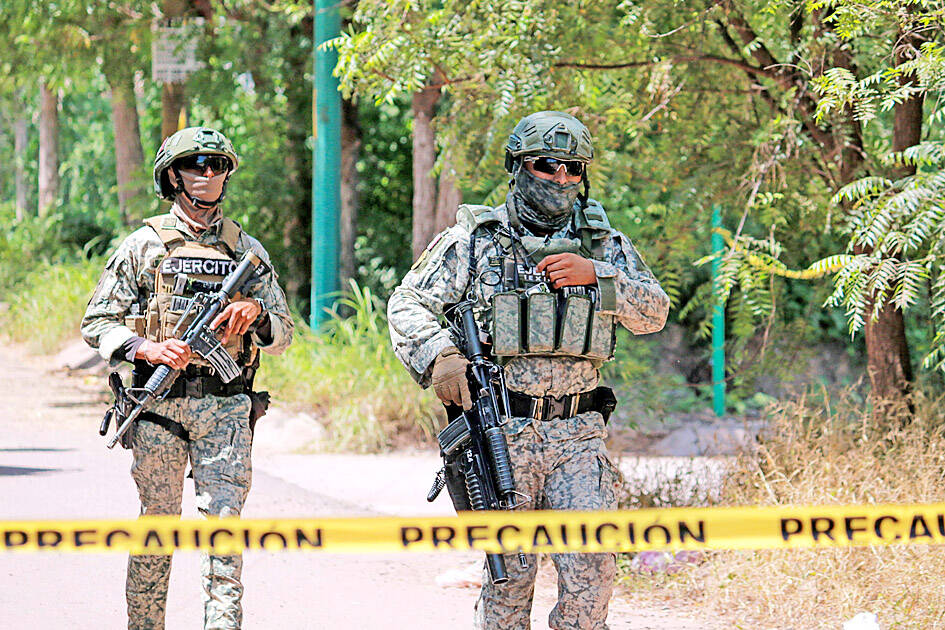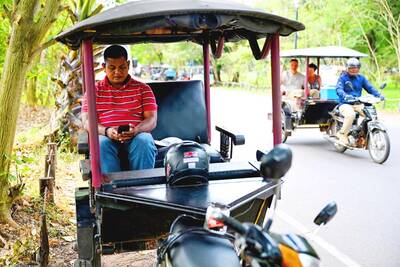Mexican President Andres Manuel Lopez Obrador on Thursday blamed the US in part for a surge in cartel violence in the northern state of Sinaloa that has left at least 30 people dead in the past week.
Two warring factions of the Sinaloa cartel have clashed in the state capital of Culiacan in what appears to be a fight for power after two of its leaders were arrested in the US in late July.
Teams of gunmen have shot at each other and the security forces.

Photo: AFP
Meanwhile, dead bodies continued to be found across the city. On one busy street corner, cars drove by pools of the blood leading to a body in a car mechanic shop, while heavily armed police in black masks loaded up another body stretched out on a side street.
Asked at his morning briefing if the US government was “jointly responsible” for the violence in Sinaloa, the president said: “Yes, of course ... for having carried out this operation.”
The recent surge in cartel warfare had been expected after Joaquin Guzman Lopez, a son of former Sinaloa cartel leader Joaquin “El Chapo” Guzman, landed near El Paso, Texas, on July 25 in a small plane with Ismael “El Mayo” Zambada.
Zambada was the cartel’s elder figure and reclusive leader.
After his arrest, he said in a letter circulated by his lawyer that he had been abducted by the younger Guzman and taken to the US against his will.
On Thursday afternoon, another military operation covered the north of Culiacan with military and circling helicopters.
Traffic was heavy in Culiacan and most schools were open, even though parents were still not sending their children to classes. Businesses continue to close early and few people venture out after dark. While the city has slowly reopened and soldiers patrol the streets, many families continue to hide, with parents and teachers fearing they will be caught in the crossfire.
“Where is the security for our children, for ourselves too, for all citizens? It’s so dangerous here, you don’t want to go outside,” one Culiacan mother told reporters.
The mother, who did not want to share her name out of fear of the cartels, said that while some schools have recently reopened, she has not allowed her daughter to go for two weeks.
She said she was scared to do so after armed men stopped a taxi they were traveling in on their way home, terrifying her child.
During his morning news briefing, Lopez Obrador said that US authorities “carried out that operation” to capture Zambada and that “it was totally illegal, and agents from the [US] Department of Justice were waiting for Mr Mayo.”
“If we are now facing instability and clashes in Sinaloa, it is because they [the US government] made that decision,” he said.
There “cannot be a cooperative relationship if they take unilateral decisions” like this, he added.
Mexican prosecutors have said they were considering bringing treason charges against those involved in the plan to nab Zambada.
Mexican president-elect Claudia Sheinbaum later in the day said that “we can never accept that there is no communication or collaboration” with the US.

The death of a former head of China’s one-child policy has been met not by tributes, but by castigation of the abandoned policy on social media this week. State media praised Peng Peiyun (彭珮雲), former head of China’s National Family Planning Commission from 1988 to 1998, as “an outstanding leader” in her work related to women and children. The reaction on Chinese social media to Peng’s death in Beijing on Sunday, just shy of her 96th birthday, was less positive. “Those children who were lost, naked, are waiting for you over there” in the afterlife, one person posted on China’s Sina Weibo platform. China’s

‘NO COUNTRY BUMPKIN’: The judge rejected arguments that former prime minister Najib Razak was an unwitting victim, saying Najib took steps to protect his position Imprisoned former Malaysian prime minister Najib Razak was yesterday convicted, following a corruption trial tied to multibillion-dollar looting of the 1Malaysia Development Berhad (1MDB) state investment fund. The nation’s high court found Najib, 72, guilty on four counts of abuse of power and 21 charges of money laundering related to more than US$700 million channeled into his personal bank accounts from the 1MDB fund. Najib denied any wrongdoing, and maintained the funds were a political donation from Saudi Arabia and that he had been misled by rogue financiers led by businessman Low Taek Jho. Low, thought to be the scandal’s mastermind, remains

Australian Prime Minister Anthony Albanese yesterday announced plans for a national bravery award to recognize civilians and first responders who confronted “the worst of evil” during an anti-Semitic terror attack that left 15 dead and has cast a heavy shadow over the nation’s holiday season. Albanese said he plans to establish a special honors system for those who placed themselves in harm’s way to help during the attack on a beachside Hanukkah celebration, like Ahmed al-Ahmed, a Syrian-Australian Muslim who disarmed one of the assailants before being wounded himself. Sajid Akram, who was killed by police during the Dec. 14 attack, and

VISHNU VANDALS: A Cambodian official accused Thailand of destroying a statue in a disputed border area, with video showing the Hindu structure being torn down The Thai military said ceasefire talks with Cambodia, set to begin yesterday, are expected to conclude with a meeting of the countries’ defense ministers on Saturday, as the two sides seek to end weeks of deadly clashes. The talks started at 4pm in Thailand’s Chanthaburi Province, which borders Cambodia. The Thai Ministry of Defense outlined several demands to be discussed ahead of the bilateral meeting of the General Border Committee (GBC) on Saturday. If secretariat-level discussions fail to reach agreement on key technical frameworks such as troop deployments, the Thai side would not proceed with the GBC meeting or sign any agreement on